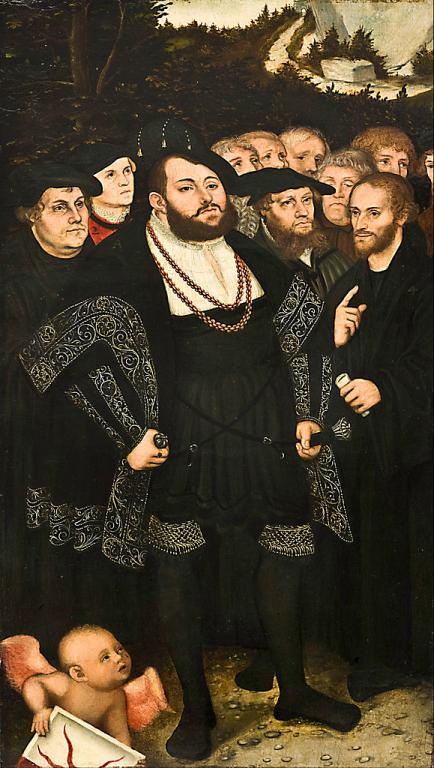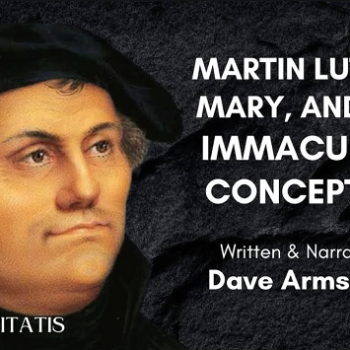. . . with special emphasis on the beliefs of the Church Fathers: were they were more “Catholic” or “Protestant”?

Pastor Ken Howes (Missouri Synod) is a good friend of mine, with whom I have enjoyed several cordial, constructive dialogues. I have great respect for him. This is a prime example of one of them. He was responding on Facebook to my article, Medieval Catholic Corruption: Main Cause of Protestant Revolt? His words will be in blue.
*****
There’s a lot to answer there, and I won’t undertake more than a short answer. Papal corruption, though it was not the chief issue in the Reformation, was indeed the immediate trigger, and it was the reason that there was so much of a response from the laity. The immediate trigger of the Reformation was that for about half a century, Popes had been routinely selling benefices, and they had been doing it on and off for several centuries.
For about thirty years, the customary way to become Pope had been to bribe the right cardinals; the Popes had been buying their office. The Simon they were most resembling wasn’t Simon Peter but Simon Magus. Leo X sold the archepiscopal see of Mainz to Albrecht von Brandenburg, who was already Archbishop of Halberstadt and bishop of one other diocese as well.
This was in violation of a couple of canons of ancient councils condemning the sale of benefices and holding more than one bishopric at the same time. Albrecht did not have the money to buy this archdiocese, so Leo suggested that he borrow the money, and raise the money to repay the banker (Bankhaus Fugger, in Augsburg) by the sale of indulgences. Leo agreed to sign the indulgences to enable Albrecht to do that. Albrecht became Archbishop of Mainz, and commissioned a Dominican monk named Johann Tetzel to sell the indulgences.
Again, this has the stench of Simon Magus about it–the sale of grace. The practice would only be outlawed in the Church in the early 1900’s by Pope Benedict XV. Martin Luther objected to the idea that absolution was being decoupled from penitence. Indeed, he wrote the 95 Theses in the belief that the Pope did not know what was going on, how his indulgences were being dispensed, as a loyal Catholic.
There was, however, another, bigger issue, and it went back to a terrific blowup in the Church in the 13th century between the Scholastics, the greatest of whom was St Thomas Aquinas, and the Augustinians who had previously dominated the Catholic Church. As the great English Catholic writer Chesterton recognizes, the Reformation was above all the great counter-stroke of the Augustinians.
It was no accident that Luther, who began the Reformation in Germany, and Robert Barnes, who began the Reformation in England, were not only both Augustinians but fairly prominent ones; Barnes was the prior of the Augustinian cloister in Cambridge, and Luther was an up-and-coming monk, priest and theologian in the Augustinian order.
It was not only a matter of bribery when, at the Diet of Worms, the Archbishop of Trier attempted to settle the dispute by offering Luther the position of prior of one of the richest monasteries in the Moselle valley in return for his being willing to cease public criticism of the papacy–he could preach what he wanted in his monastery but would have to stop making it public outside the monastery’s walls.
According to Catholic Answers (“Does the Catholic Church Still Sell Indulgences?”):
The Catholic Church does not now nor has it ever approved the sale of indulgences. This is to be distinguished from the undeniable fact that individual Catholics (perhaps the best known of them being the German Dominican Johann Tetzel [1465-1519]) did sell indulgences–but in doing so they acted contrary to explicit Church regulations. This practice is utterly opposed to the Catholic Church’s teaching on indulgences, and it cannot be regarded as a teaching or practice of the Church.
In the 16th century, when the abuse of indulgences was at its height, Cardinal Cajetan (Tommaso de Vio, 1469-1534) wrote about the problem: “Preachers act in the name of the Church so long as they teach the doctrines of Christ and the Church; but if they teach, guided by their own minds and arbitrariness of will, things of which they are ignorant, they cannot pass as representatives of the Church; it need not be wondered at that they go astray.”
For more on this topic, see my papers:
*
And thus a man who is resting upon faith, hope, and love, and who keeps a firm hold upon these, does not need the Scriptures except for the purpose of instructing others. Accordingly, many live without copies of the Scriptures, even in solitude, on the strength of these three graces. (On Christian Doctrine, I, 39:43; NPNF 1, Vol. II, 534)I believe that this practice [of not rebaptizing heretics and schismatics] comes from apostolic tradition, just as so many other practices not found in their writings nor in the councils of their successors, but which, because they are kept by the whole Church everywhere, are believed to have been commanded and handed down by the Apostles themselves. (On Baptism, 2, 7, 12; cf. NPNF 1, IV, 430)
. . . the custom, which is opposed to Cyprian, may be supposed to have had its origin in apostolic tradition, just as there are many things which are observed by the whole Church, and therefore are fairly held to have been enjoined by the apostles, which yet are not mentioned in their writings. (On Baptism, 5, 23:31; NPNF 1, IV, 475)
But those reasons which I have here given, I have either gathered from the authority of the church, according to the tradition of our forefathers, or from the testimony of the divine Scriptures, or from the nature itself of numbers, and of similitudes. No sober person will decide against reason, no Christian against the Scriptures, no peaceable person against the church. (On the Trinity, 4,6:10; NPNF 1, Vol. III, 75)
Augustine’s legacy to the middle ages on the question of Scripture and Tradition is a two-fold one. In the first place, he reflects the early Church principle of the coinherence of Scripture and Tradition. While repeatedly asserting the ultimate authority of Scripture, Augustine does not oppose this at all to the authority of the Church Catholic . . . The Church has a practical priority: her authority as expressed in the direction-giving meaning of commovere is an instrumental authority, the door that leads to the fullness of the Word itself.But there is another aspect of Augustine’s thought . . . we find mention of an authoritative extrascriptural oral tradition. While on the one hand the Church “moves” the faithful to discover the authority of Scripture, Scripture on the other hand refers the faithful back to the authority of the Church with regard to a series of issues with which the Apostles did not deal in writing. Augustine refers here to the baptism of heretics . . . (The Harvest of Medieval Theology, Grand Rapids, Michigan: Eerdmans, revised, 1967, 370-371)
I think this is fundamentally absurd, in light of, e.g., Luther’s dissent on at least 50 points by 1520, before he was excommunicated (as I have documented). Here are Luther’s 50 points of departure:
1. Separation of justification from sanctification.
2. Extrinsic, forensic, imputed notion of justification.
3. Fiduciary faith.
4. Private judgment over against ecclesial infallibility.
5. Tossing out seven books of the Bible.
6. Denial of venial sin.
7. Denial of merit.
8. The damned should be happy that they are damned and accept God’s will.
9. Jesus offered Himself for damnation and possible hellfire.
10. No good work can be done except by a justified man.
11. All baptized men are priests (denial of the sacrament of ordination).
12. All baptized men can give absolution.
13. Bishops do not truly hold that office; God has not instituted it.
14. Popes do not truly hold that office; God has not instituted it.
15. Priests have no special, indelible character.
16. Temporal authorities have power over the Church; even bishops and popes; to assert the contrary was a mere presumptuous invention.
17. Vows of celibacy are wrong and should be abolished.
18. Denial of papal infallibility.
19. Belief that unrighteous priests or popes lose their authority (contrary to Augustine’s rationale against the Donatists).
20. The keys of the kingdom were not just given to Peter.
21. Private judgment of every individual to determine matters of faith.
22. Denial that the pope has the right to call or confirm a council.
23. Denial that the Church has the right to demand celibacy of certain callings.
24. There is no such vocation as a monk; God has not instituted it.
25. Feast days should be abolished, and all church celebrations confined to Sundays.
26. Fasts should be strictly optional.
27. Canonization of saints is thoroughly corrupt and should stop.
28. Confirmation is not a sacrament.
29. Indulgences should be abolished.
30. Dispensations should be abolished.
31. Philosophy (Aristotle as prime example) is an unsavory, detrimental influence on Christianity.
32. Transubstantiation is “a monstrous idea.”
33. The Church cannot institute sacraments.
34. Denial of the “wicked” belief that the mass is a good work.
35. Denial of the “wicked” belief that the mass is a true sacrifice.
36. Denial of the sacramental notion of ex opere operato.
37. Denial that penance is a sacrament.
38. Assertion that the Catholic Church had “completely abolished” even the practice of penance.
39. Claim that the Church had abolished faith as an aspect of penance.
40. Denial of apostolic succession.
41. Any layman who can should call a general council.
42. Penitential works are worthless.
43. None of what Catholics believe to be the seven sacraments have any biblical proof.
44. Marriage is not a sacrament.
45. Annulments are a senseless concept and the Church has no right to determine or grant annulments.
46. Whether divorce is allowable is an open question.
47. Divorced persons should be allowed to remarry.
48. Jesus allowed divorce when one partner committed adultery.
49. The priest’s daily office is “vain repetition.”
50. Extreme unction is not a sacrament (there are only two sacraments: baptism and the Eucharist).
If that is “reform” and not “revolution” then certainly a different definition of “reform” is being utilized. It’s easy to grasp my point, by using analogy: I go into the headquarters of LCMS and say that LCMS has gotten 50 major things wrong about the Christian faith, and I demand that I should be treated like a good Lutheran who has no desire to leave Lutheranism: but merely to bring Lutheranism back to its proper roots.
I’m happy to grant sincerity: no problem; always have been. Luther was sincere (and dead wrong on much of his agenda). Calvin was sincere; so were Zwingli and all the rest. I am vigorously disputing the patristic interpretation of the Protestant founders and Protestant polemicists ever since.
Dialogue: Is Lutheranism or Catholicism Closer to the Fathers? (vs. Kristo Miettinen) [6-3-05]
Development of Sacrifice of the Mass: Dialogue w Lutheran [9-22-05]
Dialogue with a Lutheran: Church Fathers & Sola Scriptura (vs. Nathan Rinne) [10-13-11]
Dialogue with a Lutheran: Rule of Faith / Fathers / Ecclesiology (vs. Nathan Rinne) [10-17-11]
***
(originally 3-27-12 on Facebook; edited with links added on 1-8-20)
Photo credit: Martin Luther and the Wittenberg Reformers (c. 1543), by Lucas Cranach the Younger (1515-1586). Luther (left) with the Reformers and their protector, the Elector of Saxony, John Frederick the Magnanimous (1532-1547), right Philipp Melanchthon (1497-1560), man behind Luther is most often identified as Georg Spalatin (1484-1545), the man behind John Frederick’s left shoulder is probably Saxon Chancellor Gregor Brück (1485-1557) [public domain / Wikimedia Commons]
***













